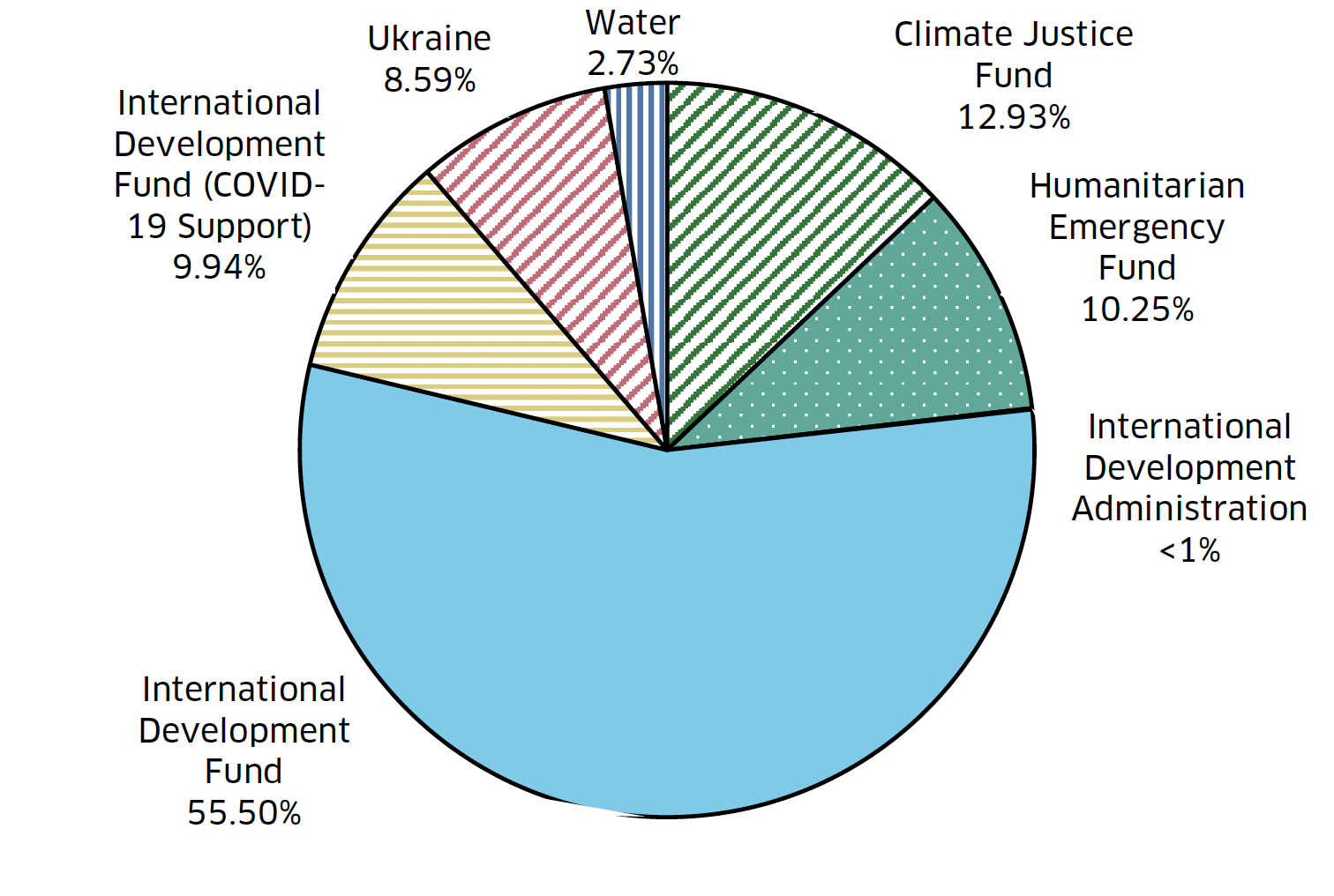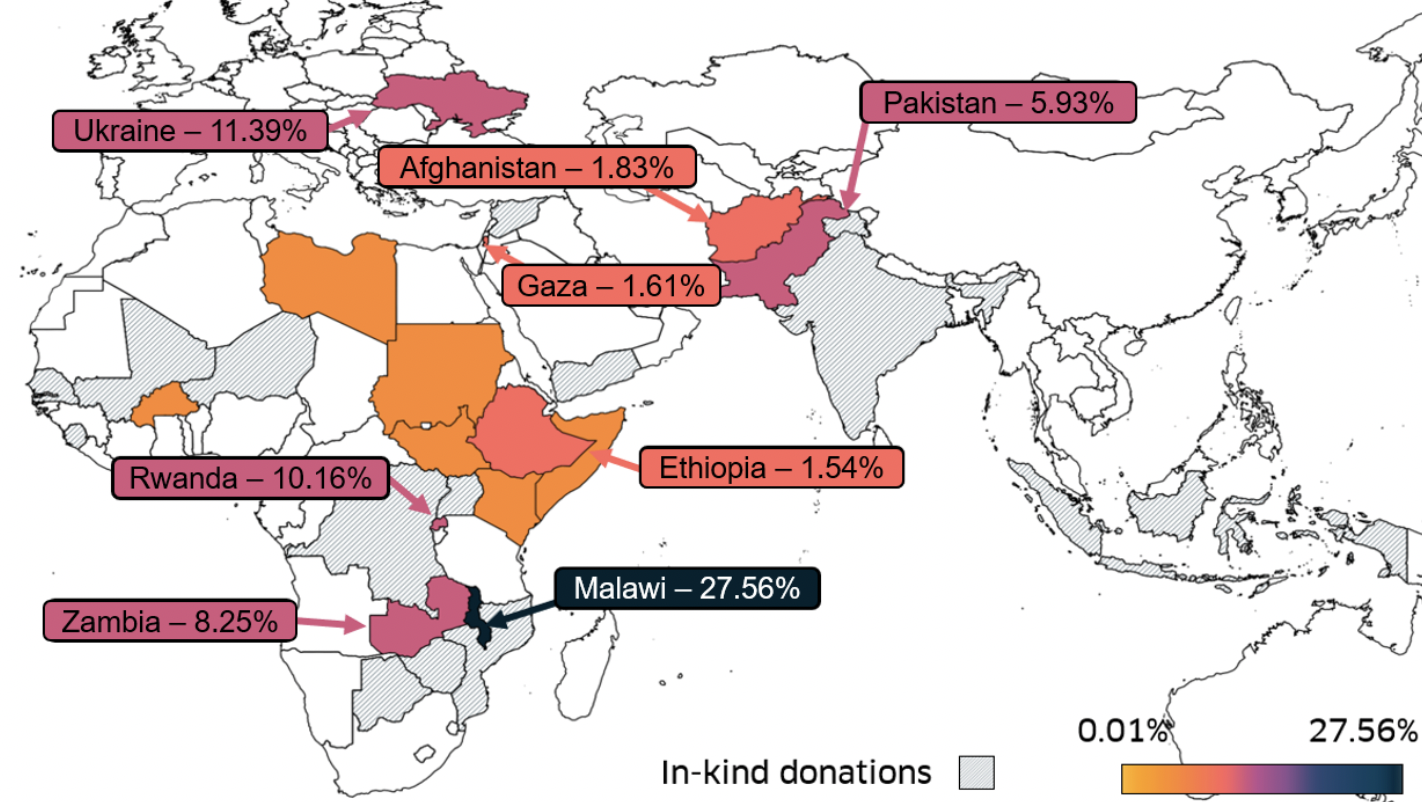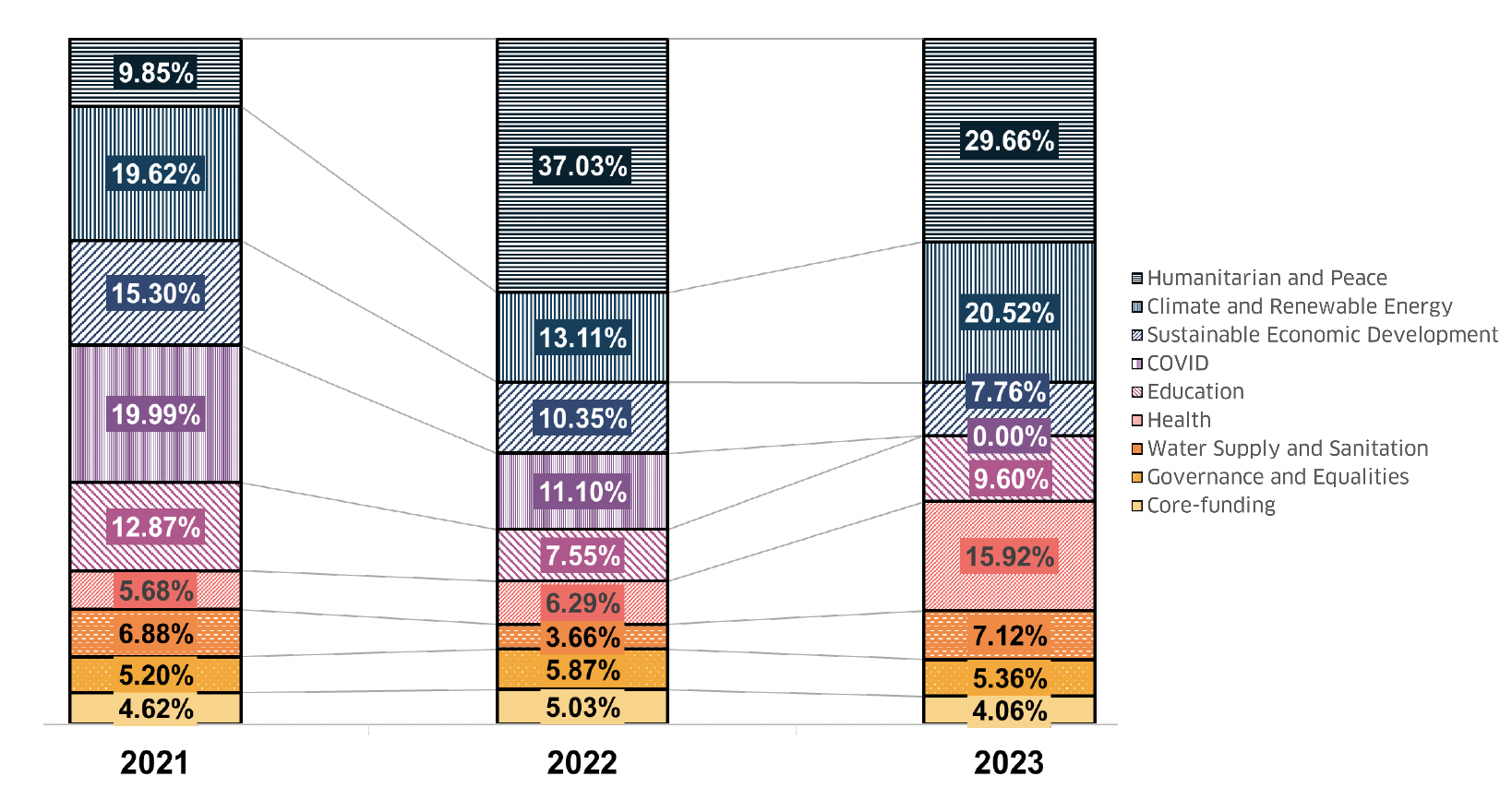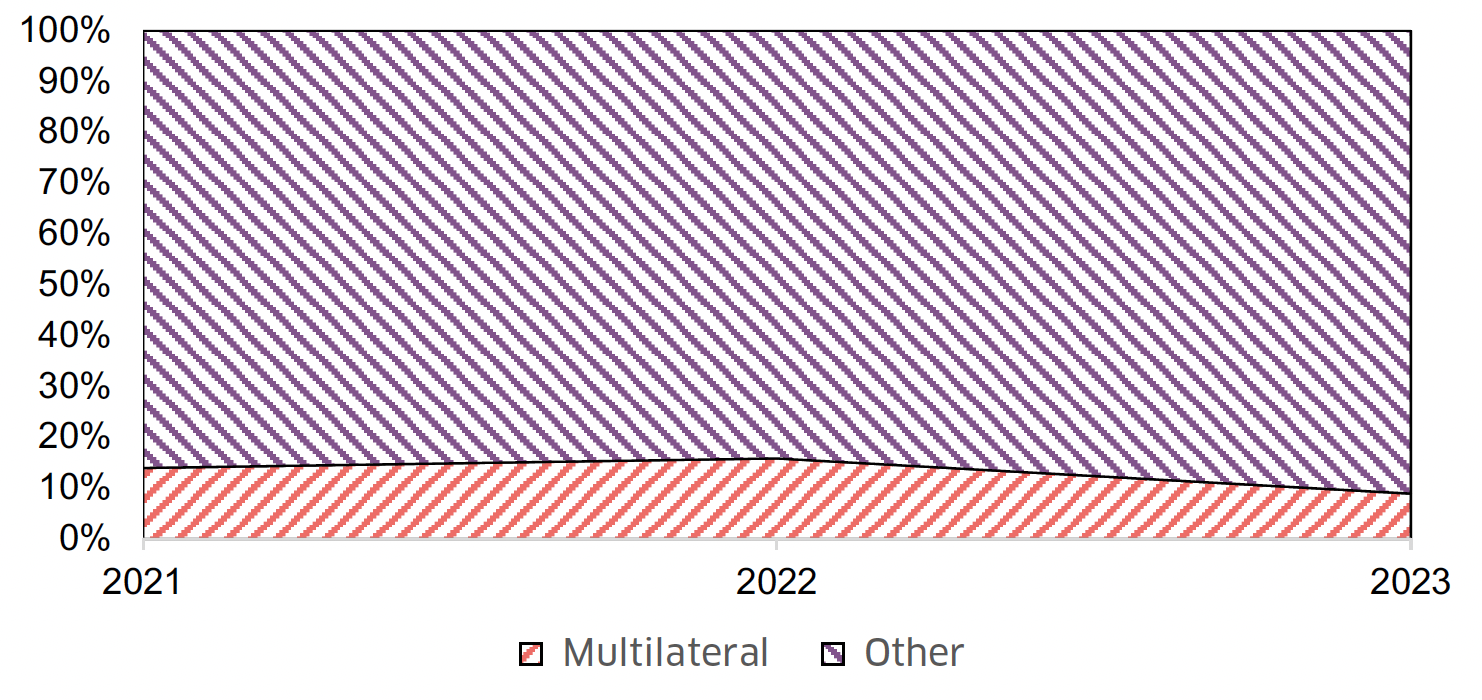Contribution to international development: report 2021 to 2023
Report taking a holistic look at a wide cross-section of our international development activity and presents it within the context of the UN Sustainable Development Goals.
1. Overview of Scottish Government Official Development Assistance (ODA)
In this Chapter we set out how our funding streams for international development, climate justice and humanitarian aid financing were delivered during 2021-23. This Chapter summarises our projects detailed in Annex I where we set out a complete breakdown of our ODA projects in each of years 2021-23.
1.1. Scottish Government ODA in 2021-23 (How Much, Where and What)
What are our funding streams? During 2021-23 the three key funding streams which contributed to the majority of Scottish Government ODA were our: International Development Fund; Humanitarian Emergency Fund; and Climate Justice Fund:
- our International Development Fund (IDF) has, since 2005, supported development assistance programmes in our partner countries, institutional partnerships between Scotland and our partner countries, and co-funded collaboration with other donors
- our Humanitarian Emergency Fund (HEF) during the period of this Report provided humanitarian funding to support crises as they occurred
- our Climate Justice Fund (CJF) helps tackle the effects of climate change in the poorest, most vulnerable countries, based on a simple and powerful message: the poor and vulnerable at home and overseas are the first to be affected by climate change, and will suffer the worst, yet have done little or nothing to cause the problem
- additionally, however, as is set out in this chapter, also included within our ODA spend during this period are other amounts of Scottish Government development assistance provided, including support or Water and Sanitation through “Hydro Nation” (see Chapter 8) and additional Government funding that was made available for humanitarian aid assistance for Ukraine (see Chapter 9)

| Funding Stream | 2021 | 2022 | 2023 | Total |
|---|---|---|---|---|
| Climate Justice Fund | £2,075,887 | £1,333,124 | £2,606,919 | £6,015,930 |
| Humanitarian Emergency Fund | £973,580 | £1,299,000 | £2,500,000 | £4,772,580 |
| International Development Administration | £0 | £24,850 | £0 | £24,850 |
| International Development Fund | £7,907,976 | £7,222,612 | £10,701,054 | £25,831,643 |
| International Development Fund (COVID-19 Support) | £2,874,285 | £1,750,000 | £0 | £4,624,285 |
| Ukraine | £0 | £4,000,000 | £0 | £4,000,000 |
| Water | £549,428 | £131,759 | £589,726 | £1,270,914 |
| Total | £14,381,156 | £15,761,345 | £16,397,699 | £46,540,201 |
Over this Parliament, the Scottish Government’s commitment to ODA spend has grown, through the trebling of our CJF from 2022, providing £36 million across this Parliament, and the Programme for Government commitment to also increase the IDF to reach £15 million per annum in this Parliament (to 2026).
How much did we provide in development finance? In each of calendar years 2021, 2022 and 2023 our total ODA spend was £14,381,156, £15,761,345 and £16,397,699 (excluding in-kind donations of medical equipment during this time). As set out in the Introduction to this Report, the Scottish Government reports its ODA spend to the UK Government each year, it is then included by the UK Government within its overall ODA return to the Organisation for Economic Co-operation and Development (OECD) and counted within the overall UK ODA towards its commitment to spend a set percentage of UK gross national income on ODA.[4][5] Annex I sets out a breakdown of our ODA spend in each year.
Where did we fund? In the table below, we show that between 2021 and 2023 the Scottish Government provided ODA in over 29 countries. Most funding was provided to Malawi, followed by Ukraine, Rwanda, Zambia and Pakistan. ODA spend in non-partner countries such as Botswana and Mozambique during this period reflects the COVID-19 large-scale PPE initiative in 2021 we supported through our partnership with KidsOR, detailed in Chapter 4.

| Country | 2021 | 2022 | 2023 | Total |
|---|---|---|---|---|
| Malawi | £5,463,131 | £4,051,555 | £3,311,939 | £12,826,625 |
| Ukraine | £0 | £4,160,724 | £1,139,276 | £5,300,000 |
| Rwanda | £2,052,549 | £1,324,693 | £1,350,078 | £4,727,320 |
| Zambia | £1,242,841 | £911,073 | £1,684,745 | £3,838,659 |
| Pakistan | £460,000 | £650,000 | £1,650,000 | £2,760,000 |
| Afghanistan | £360,000 | £240,000 | £250,000 | £850,000 |
| Gaza | £0 | £0 | £750,000 | £750,000 |
| Ethiopia | £340,350 | £125,000 | £250,000 | £715,350 |
| Kenya | £0 | £0 | £250,000 | £250,000 |
| Libya | £0 | £0 | £250,000 | £250,000 |
| Sudan | £0 | £0 | £250,000 | £250,000 |
| South Sudan | £241,000 | £0 | £0 | £241,000 |
| Somalia | £0 | £125,000 | £0 | £125,000 |
| Burkina Faso | £0 | £123,000 | £0 | £123,000 |
| Regional | ||||
| South of Sahara, regional | £3,322,782 | £2,215,729 | £2,143,809 | £7,682,320 |
| Unspecified | £898,503 | £1,834,572 | £2,117,853 | £4,850,927 |
| Middle East | £0 | £0 | £500,000 | £500,000 |
| East Africa | £0 | £0 | £500,000 | £500,000 |
| Total | £14,381,156 | £15,761,345 | £16,397,699 | £46,540,201 |
What did we fund? The tables below demonstrate the breakdown of Scottish Government ODA spend during 2021-23 by sector as reported to the FCDO. Details on projects in these sectors are set out in the remaining chapters of this Report, and in Annex I.
In Malawi, Zambia, and Rwanda, during the period of this Report the IDF was focused on our traditional sectors of health (c.2), inclusive education (c.3), equalities (c.4), renewable energy (c.6), and economic development (c.5) and global citizenship (c.10). In Pakistan, our focus continued to be on inclusive education through women and girls’ scholarships (c.3).
The tables below also reflect our humanitarian spend (c.9), Climate Justice spend (c.7), and Water Futures programme (c.8).

| Sector | 2021 | 2022 | 2023 | Total |
|---|---|---|---|---|
| Core-funding | £664,191 | £793,465 | £665,259 | £2,122,915 |
| Governance and Equalities | £747,791 | £925,457 | £878,259 | £2,551,507 |
| Water Supply and Sanitation | £988,929 | £576,081 | £1,167,703 | £2,732,713 |
| Health | £817,032 | £991,879 | £2,610,994 | £4,419,905 |
| Education | £1,850,301 | £1,190,596 | £1,574,838 | £4,615,735 |
| COVID-19 Support | £2,874,285 | £1,750,000 | £0 | £4,624,285 |
| Sustainable Economic Development | £2,200,742 | £1,631,331 | £1,271,643 | £5,103,716 |
| Climate and Renewable Energy | £2,821,772 | £2,066,602 | £3,364,727 | £8,253,101 |
| Humanitarian and Peace | £1,416,113 | £5,835,934 | £4,864,276 | £12,116,323 |
| Total | £14,381,156 | £15,761,345 | £16,397,699 | £46,540,201 |
1.2. Scottish Government ODA in 2021-23 (How and Who)
In terms of how we work, the majority of Scottish Government development finance has always been awarded competitively. We also, at times, support initiatives on a non-competitive basis. This includes, in line with our 2016 Strategy, the provision of development assistance on a match-funding basis in order to maximise the total investment for the benefit of our partner countries.[6] Over the last 3 years we have consistently awarded approximately 57% of our ODA competitively. This figure would have been higher, however spend on humanitarian crises, with multilaterals and in particular the Covid crisis resulted in a larger number of direct awards during this period, explained below. This year and last, the Scottish Government is putting out an array of competitive funding awards for both procurement and grants, so the competitively awarded share will significantly rise in future years.
During the period of this Report, the way in which we awarded grants fell into 6 broad categories:
1. Traditionally competitively awarded grants, which included:
A. our IDF Rwanda and Zambia Development Programmes, each consisting of a number of projects, were awarded as cohorts of country programme projects to run from 2017-22; and our IDF Malawi Development Programme projects were awarded to run from 2018-231; and
B. CJF competitive funding.
2. Traditionally non-competitively awarded grants, which included:
A. IDF core funding for international development networking organisations: Scotland’s International Development Alliance; the Scotland Malawi Partnership, the Malawi Scotland Partnership; the Scottish Fair Trade Forum; and Scotland’s Development Education Centres; and
B. delivery of our IDF Scotland-Pakistan Scholarships for Women and Girls, awarded on a non-competitive basis to the British Council Pakistan since 2013.
3. Traditionally non-competitively awarded grants to public institutions / match funding, which included:
A. our IDF investment in Police Scotland’s peer-peer partnerships (since 2016) with the Police Forces of Malawi and Zambia on gender-based violence training; and
B. our collaboration with Comic Relief on our Levelling the Field II Programme, enabling women and girls to reach their full potential through sport and our pooled IDF funding arrangement with Comic Relief, another funder, ensured a leverage of our own contribution.
4. We also, over the COVID-19 period, opted to work with some trusted partners to maximise IDF spend and impact for our partner countries, including:
A. supporting our partner country governments’ vaccine programmes: our strategic grants to UNICEF to support our partner countries’ national COVID-19 response and vaccination programmes; as it is common for donors to award Multilateral organisations, like UN agencies, grants directly rather than by competition.
B. providing large oxygen concentrators/ventilators/PPE: funding to KidsOR, who supported transporting medical equipment to Malawi, Zambia and Rwanda, enabling us to supply Oxygen concentrators and ventilators, as well as the donation of £14 million worth of PPE equipment through the NHS Scotland Global Citizenship Programme; through our IDF investment, KidsOR also raised a further £1 million from the Wood Foundation, Pula Limited, Postcode Trust and Delta Philanthropies to support transport of the PPE, and in each case, KidsOR also contributed their staffing resource to enable this large-scale donation from Scotland of O2 concentrators/ventilators/PPE needed for our partner countries’ and other countries’ COVID-19 responses.
C. This was a large spend over the period, and was awarded 100% directly to partners.
5. We also provided humanitarian funding, principally through:
A. our standing Humanitarian Emergency Fund Panel (8 Scottish iNGO members), and the Disasters Emergency Committee (15 UK-wide iNGO members); which is a competitive process and
B. some other trusted partners to target funding and maximise impact, including: humanitarian funding for Ukraine through UNICEF to support work providing life-saving services and support families, including children with disabilities; and humanitarian funding for Gaza through UNRWA; as noted above, it is common for donors to award Multilateral organisations, like UN agencies, grants directly rather than by competition.
6. Finally, we provided a range of other non-competitive funding, including through:
A. HydroNation funding, such as: the Scottish Government’s Water Futures Programme in Malawi; the Malawi Scotland Regulatory Partnership (National Water Resources Authority); and Scotland’s Global Partnership for Knowledge and Expertise in Water and Climate (SPARKE);
B. IDF funded initiatives, such as: in Health for the Blantyre-Blantyre Laboratory, Livingstone Fellowships for doctors in our partner countries to undertake training in their specialisms in NHS Scotland; in renewable energy, including the KidsOR Solar Surgery funding; and our 1325 Women in Conflict Fellowships;
C. CJF funded initiatives, such as: the Climate Justice Resilience Fund Partnership; Loss and Damage case studies; and the International Centre for Climate Change and Development National Framework on Loss and Damage; and the Young Malawian Climate Leaders project.
As with the IDF, while the majority of the CJF supported projects are funded competitively, there are examples of non-competitive awards as above. For instance, delivery partners may be selected on the basis of their ability to obtain additional funding. This furthers the impact of our programming and ensures that that more vulnerable communities receive support.
Share of multilateral Below we show the breakdown of Scottish Government ODA provided to multilateral organisations during 2021-23, compared to other organisations we funded in this same period:

| Organisation Type | 2021 | 2022 | 2023 | Total |
|---|---|---|---|---|
| Multilateral | £2,000,000 | £2,500,000 | £1,462,000 | £5,962,000 |
| Other | £12,381,156 | £13,261,345 | £14,935,699 | £40,578,201 |
| Total | £14,381,156 | £15,761,345 | £16,397,699 | £46,540,201 |
The increase of funding to multilateral organisations referenced above during 2021-23 was driven by the following factors:
- COVID-19 Impact: as noted above, the period 2021-23 included key years when COVID-19 was impacting our partner countries. With a portion of finance we supported the UN-mandated organisation with the most operational capacity to deliver vaccination programmes, and existing partner of the Governments – the United Nations International Children’s Emergency Fund (UNICEF);
- Ukraine: beyond the impact of COVID-19, February 2022 then saw Russia’s invasion of Ukraine, in response to which in the initial months the Scottish Government mobilised £4 million in additional financial humanitarian aid to help provide basic humanitarian assistance, including in health, water and sanitation, and shelter for those fleeing Ukraine: £1 million of that was allocated to UNICEF, to support work providing life-saving services and support families, including children with disabilities.
- New international development programmes: our new International Development Fund programmes, coming on-stream from 2023/24, now blend competitively awarded financing to a wide range of organisations, with non-competitive funding through strategic new partnerships with multilaterals such as the WHO in our Health programme and the World Bank in our new Inclusive Education programme. In September 2023, we launched our funding of the Health4Life programme, run by WHO/UNDP/UNICEF, which sees us invest up to £2.5 million over the next 5 years to support global action and progress on the prevention of non-communicable diseases such as heart attacks, strokes and cancers.[7] The WHO invited Scotland to become the first high-income donor to the Health4Life fund following our collaboration with Global South partners on tackling non-communicable diseases. The first grant payment of £0.5 million to the Helath4Life programme was made in 2023 and is therefore included in our multilateral spend during that year.
Contact
Email: ceu@gov.scot
There is a problem
Thanks for your feedback